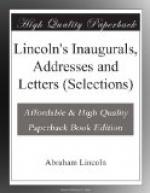INAUGURALS, ADDRESSES, AND LETTERS
Address to the People of Sangamon County,
March 9, 1832
The Perpetuation of our Political Institutions,
January 27, 1837
Speech at Springfield, Illinois, June
16, 1858
Second Joint Debate at Freeport, August
27, 1858
The Cooper Institute Address, Monday,
February 27, 1860
Farewell Address at Springfield, Illinois,
February 11, 1861
Address in Independence Hall, Philadelphia,
February 22, 1861
First Inaugural Address, March 4, 1861
Response to Serenade, March 4, 1861
Letter to Colonel Ellsworth’s Parents,
May 25, 1861
Letter to Horace Greeley, August 22, 1862
Extract from the Second Annual Message
to Congress, December 1, 1862
The Emancipation Proclamation, January
1, 1863
Thanksgiving Proclamation, July 15, 1863
Letter to J. C. Conkling, August 26, 1863
Gettysburg Address, November 19, 1863
Letter to Mrs. Bixby, November 21, 1864
Second Inaugural Address, March 4, 1865
Last Public Address, April 11, 1865
Appendix. Autobiography, December 20, 1859
NOTES
INTRODUCTION
The facts of Lincoln’s early life are best stated in his own words, communicated in 1859[see Appendix] to Mr. J. W. Fell, of Bloomington, Illinois. Unlike many men who have risen from humble surroundings, Lincoln never boasted of his wonderful struggle with poverty. His nature had no room for the false pride of a Mr. Bounderby, even though the facts warranted the claim. Indeed, he seldom mentioned his early life at all. On one occasion he referred to it as “the short and simple annals of the poor.” Lincoln himself did not in any way base his claims to public recognition upon the fact that he was born in a log cabin and that he had split rails in his youth, although, on the other hand, he was not ashamed of the facts. More, perhaps, than any other man of his time he believed and by his actions realized the truth of Burns’ saying, “The man’s the goud, for a’ that.” The real lesson to be drawn from Lincoln’s life is that under any conditions real success is to be won by intelligent, unwavering effort, the degree of success being determined by the ability and character of the individual. Still less profitable is the attempt to contrast the success of Lincoln with that of Washington, or Jefferson or of any other American whose early circumstances were more favorable than Lincoln’s. In each case success has been worthily won, and we Americans of the present generation should rejoice that our country has produced so many great men. True patriotism does not consist in the recognition of only one type of Americanism, but rather in the grateful acceptance of every service that advances the fortunes and raises the reputation of the republic.




